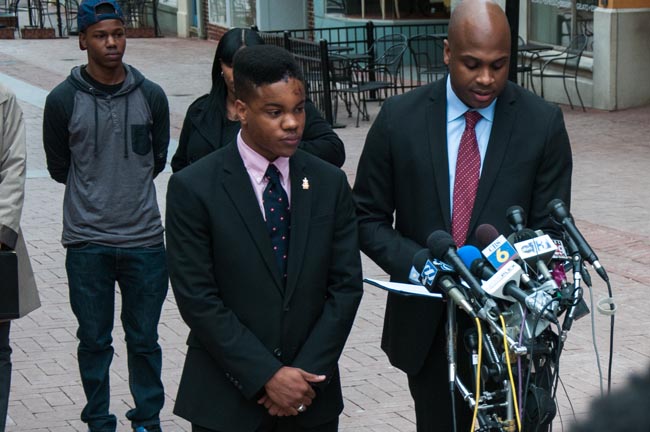Images of black U. Va. student Martese Johnson lying prone and bloodied on the Charlottesville pavement following an encounter with law enforcement March 18 have provoked outrage and exasperation. As an addendum to the growing conversation about the relationship between law officers and historically oppressed groups, the incident has incited further tension.
After Johnson was refused entrance into one of Charlottesville’s bars, Virginia Alcohol and Beverage Patrol officers swarmed him and forcibly (and, some would say, violently) shoved him to the ground. An especially disturbing photograph shows Johnson’s face streaming with blood as a hand pins him down. Johnson’s defenders claim that he, like black men historical and contemporary, was treated so appallingly because of the implicit belief that black Americans are less valuable to civil society than white Americans. Others dismiss this claim, arguing instead that Johnson was handled with appropriate force after drunkenly refusing to cooperate with authorities.
These voices have reappeared at regular intervals in the past few months following the deaths of Michael Brown, Eric Garner and Tamir Rice at the hands of police officers. Supporters of the Black Lives Matter movement have attempted to sustain public dialogue about race and power even as these high-profile events die out with the turn of the media cycle. Their opponents have been content to address each incident in isolation. Certainly there is merit to evaluating the egregious mistreatment of Brown, Garner, Rice and, yes, Johnson at the hands of police. There has been, and currently is, an asymmetrical relationship between the U.S. government and its black citizens. In a self-appointed “post-racial” United States, these concerns are too often shunted aside. As an assembly of humans in constant interaction and not a solipsistic array of detached individuals, there is an absolute need to have this conversation. Yet something is still missing.
In the muddle of polarization is lost the reality of racism. Racism is not a once-a-month affair or a spectacle that can be easily captured on camera. Racism is not a minute-long segment on the nightly news. Racism is not just hate-crime brutality or a slur shouted out of a car window. Racism can be invisible, ingrained and seemingly innocuous. But racism is not an abstraction; it is a real human experience. The sensational quality of widely-publicized cases such as Johnson’s allows the true nature of racism to hide behind violence and vitriol. Racism isn’t always manifested in such visible ways.
That’s not to say that Johnson’s case wasn’t a product of racism; it was. The fact that his feet were chained is truly terrifying. But let’s not confuse the product of racism with the corpus of racism. Bigotry instills itself in the daily realities of American life. It is present in everyday microaggressions that slowly erode the mental and physical wellbeing of victims. It is present in the assumptions made about people’s morality and intelligence because of the way they speak or present themselves. It is present in personal, not distant, measure.
Self-congratulation in the face of overt displays of racism is dangerously tempting. It’s easy to compare our campus to U. Va.’s and remark in unearned pride, “Well, it wasn’t us.” The spectacle of Johnson’s encounter with the police makes such a comparison ever more effortless. We haven’t had a graphic, viscera-shredding, nationally-publicized incident, so racism must not be a problem for us. But racism has been our problem and continues to be our problem. The College admitted its first black student in 1951, but did not open all programs to black Americans until the 1970s. The College was intimately involved in the history of a nation that treated nonwhites as less than human. We have not achieved an environment of encompassing acceptance. Prejudice persists and a lack of spectacle should not indicate otherwise.
Email Quinn Monette at qpmonette@email.wm.edu.

